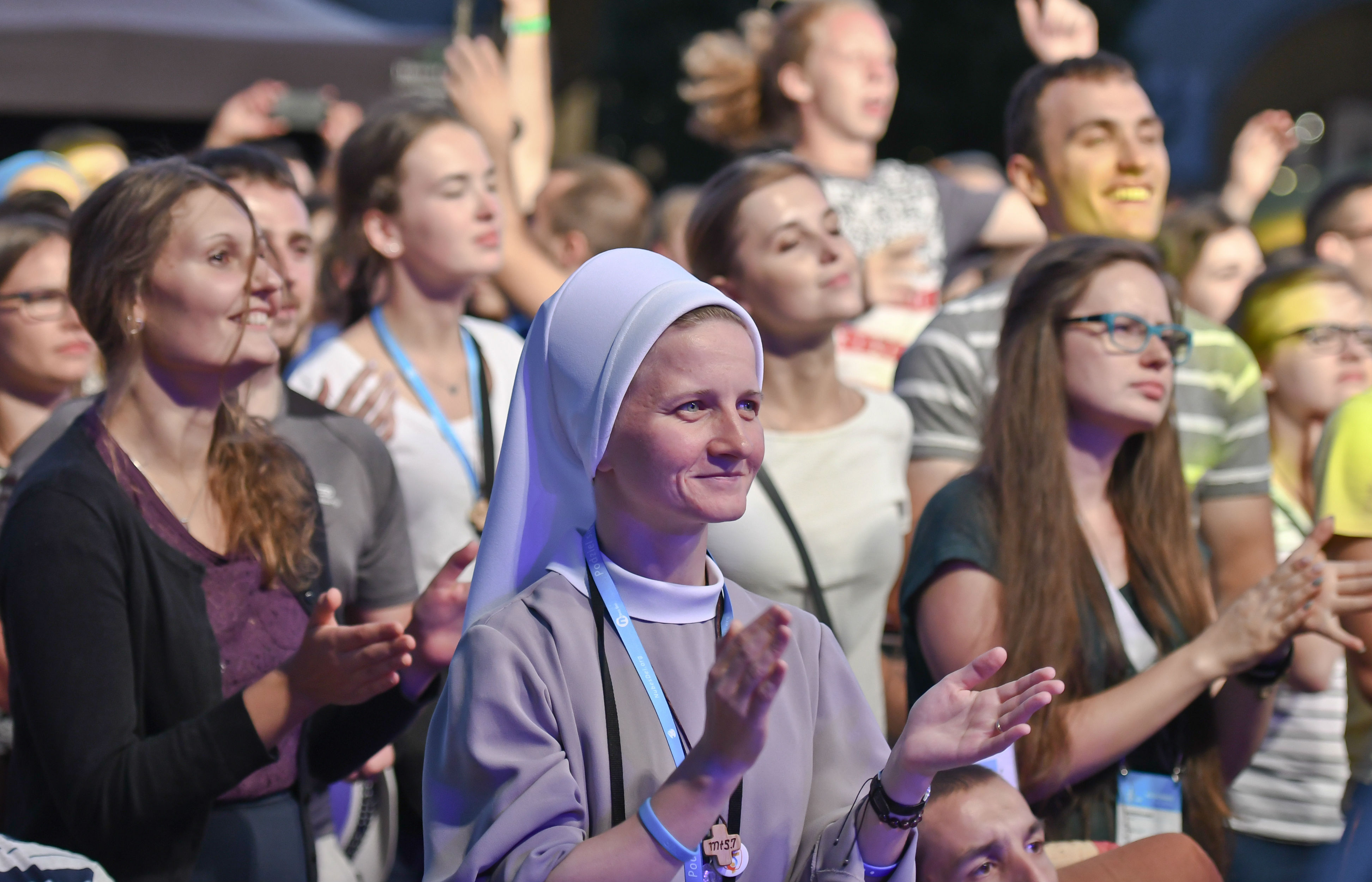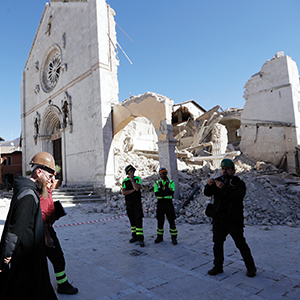Italy’s most powerful earthquake since 1980 has left more than 15,000 people homeless, according to the country’s civil protection agency. No one was killed in Sunday’s 6.6 magnitude quake but 20 were injured and damage to the area round the town of Norcia is extensive. The medieval basilica of St Benedict (above) was among many historic buildings destroyed. The Benedictine monks of Norcia have been assisting relief efforts as well as helping to guide anxious residents to the main square and leading them in prayer.
Following the destruction of the basilica built atop the birthplace of their founder and his twin sister, St Scholastica, the monks said they hoped the image of the destroyed church may “illustrate the power of this earthquake and the urgency we monks feel to seek out those who need the Sacraments on this difficult day for Italy”. Cardinal Gualtiero Bassetti of Perugia-Città della Pieve advised priests not to celebrate Mass indoors over the next several days, including on 1 November, the Solemnity of All Saints, which is also a national holiday in Italy.
South Sudan visit plan
Pope Francis would like to visit South Sudan, according to church leaders invited to meet with him at the Vatican last week. “He told us he wanted to come to South Sudan,” reported Archbishop Paolino Lukudu Loro of Juba, who was part of an ecumenical delegation including Revd Daniel Deng Bul Yak, Archbishop of the Province of the Episcopal Church of South Sudan and Sudan; and Revd Peter Gai Lual Marrow, Moderator of South Sudan’s Presbyterian Church. At their meeting with Pope Francis on 27 October, the church leaders reported the resurgence of civil war between government troops loyal to President Salva Kiir and opposition forces following the former deputy president, Reik Machar.
Blasphemy case judge quits
A senior Pakistani judge who forced the final Supreme Court appeal hearing of the blasphemy case against Asia Bibi to be postponed has resigned from the judiciary. Judge Iqbal Hameed-ur-Rehman shocked the courtroom on 13 October when he said he could not make a decision on whether Bibi, a Christian mother of five who was sentenced to death in 2010, should be hanged because he had a conflict of interest. He had overseen the appeal hearing of the murderer of Salmaan Taseer, the politician who had campaigned for Bibi to be released. After stepping down from the case some accused the judge of fearing reprisals if he exonerated Bibi. The British Pakistani Christian Association called it “an act of cowardice”. Its chairman Wilson Chowdhry suggested Bibi’s only real hope for freedom was a presidential pardon, but it would take great bravery for President Mamnoon Hussain to give one.
Colombia’s President, Juan Manuel Santos, has solicited revisions to the Peace Accords that were rejected in a 2 October plebiscite. FARC negotiators are in Havana, Cuba and will review potential changes to the Peace Accords signed on 26 September. Negotiations have also begun in Quito, Ecuador between the National Liberation Army (ELN) and the Colombian Government. Mr Santos said in an interview with the EFE news agency that the two negotiation processes are separate but aim towards the same goal of lasting peace. Since the plebiscite, Mr Mr Santos has met diverse sectors of society to solicit revisions to the Peace Accords with FARC, and received approximately 500 proposals. Leaders of the “No” vote, including former president Alvaro Uribe, are calling for prison sentences for FARC militants, who were to be granted amnesty in the original deal. The Colombian Episcopal Conference (CEC) has asked Mr Santos to accept the changes to the peace terms that different sectors have proposed.
Bishop rebukes Chaput
In a rare public rebuke, Bishop Robert Lynch of St Petersburg, Florida wrote in his blog that he was “appalled” by the proposal for a “smaller, purer” Church articulated by Archbishop Charles Chaput of Philadelphia in a recent speech at the University of Notre Dame.
Poland’s Catholic Church is to allow the exhumation the late president Lech Kaczynski and wife Maria (above) from Krakow’s Wawel Cathedral, after prosecutors reopened investigations into their deaths in an April 2010 air crash in Russia. “The Procurator-General has asked our parish to help with the exhumation of Maria and Lech Kaczynski,” Fr Zdzislaw Sochacki, the cathedral rector, told Poland’s Catholic information agency (KAI). “Cardinal Stanislaw Dziwisz has agreed and commissioned two priests for the task.” Poland’s governing Law and Justice party, headed by Kaczynski’s twin brother, Jaroslaw, has questioned the official account of the disaster in which the president and 95 other prominent figures died.
For the first time in Bangladesh, a Catholic has been chosen for a key role in the leading political opposition party. Albert Costa was elected on 27 October as president of Jubo Dai, the youth wing of the Bangladesh Nationalist Party (BNP). Catholics represent just 0.4 per cent of the population of about 160 million.
The Venezuelan Government and opposition representatives sat down at the negotiating table last Sunday, a week after President Nicola Maduro visited the Vatican and Pope Francis urged him to hold talks with the Opposition.
In the first face-to-face meeting between the two sides this year, Mr Maduro shook the hands of the five opposition leaders who attended the talks. They set a date of 11 November for a “national dialogue” to begin. The Vatican envoy mediating the talks with international representatives, Archbishop Claudio Maria Celli, said the fact that the two sides had met was “very positive”. A 26 October march in Caracas (above) drew thousands, calling for a suspended referendum on Maduro’s removal to go ahead.
The “burial bed” on which the body of Jesus Christ is believed to have been laid after he was crucified is being exposed for the first time in many centuries as part of a US$4 million restoration project at the Church of the Holy Sepulchre in Jerusalem. According to a report in the National Geographic, the original marble slab, measuring 3ft by 5ft, has been exposed to give researchers an opportunity to study the original surface of what is considered the most sacred site in Christianity. The analysis will help archaeologists better understand the original form of the tomb chamber.
03 November 2016, The Tablet
News Briefing: global
 Loading ...
Loading ...
Get Instant Access
Subscribe to The Tablet for just £7.99
Subscribe today to take advantage of our introductory offers and enjoy 30 days' access for just £7.99



